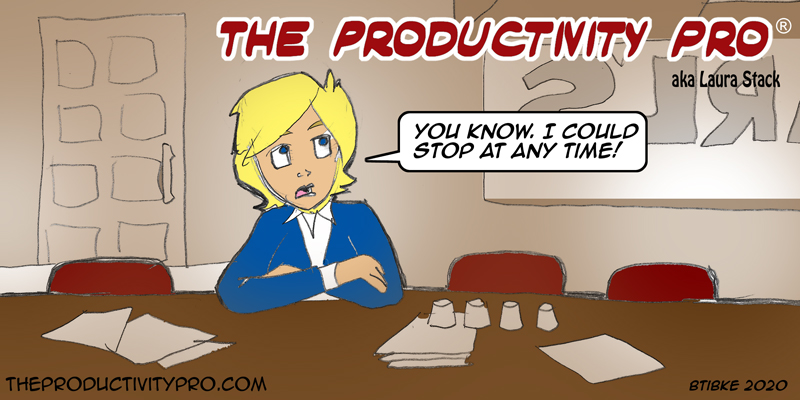
“Habit is habit and not to be flung out of the window… but coaxed downstairs a step at a time.”—Mark Twain, American author and storyteller
Unlike the form of substance abuse it was named after, workaholism is neither a disease nor an addiction. Rather, it’s an out-of-control bad habit that can damage your health, ruin relationships, destroy self-esteem, and even kill you. It may make you a bit more productive, but the productivity rise typically proves minimal; for most workers, a 40- to 45-hour workweek is just as productive as an 80-hour week. The human mind and body soon hit a point of diminishing returns where fatigue and mistakes slow you down. There are much easier, more reasonable ways to boost your productivity.
Fortunately, the habit of overwork can be broken (ironically enough) with sufficient dedication and effort—and must be, if you value your social life and health. If you find yourself spiraling toward workaholism, start with these simple ideas and keep moving forward.
- 1. Change your mindset. This may be the most difficult step of all, which is why I put it first. Many of us grew up with a Puritan work ethic urging us to give our work our all. This puzzles people in most other Western societies, who usually work fewer hours but do just as well financially and socially. (Admittedly, our work ethic—along with our cultural diversity, large population, and vast resources—has put us at the forefront of the world stage.) The rise of ubiquitous, inexpensive communications technology has made it harder than ever to divide your work time from your personal life. Sometimes this goes ridiculously far. As recently as late 2015, some Amazon.com managers would email workers questions after midnight—then text them, demanding an answer, just minutes later.
Too much such pressure, whether self-applied or external, makes you feel hyper-alert, nervous, insomniac, depressed, helpless, and unwilling to disengage from work lest you miss something important. I’ve been there. It’s not worth it. The work will get done, and will likely be of better quality, if you stop thinking this way. It takes time to change your mindset, so don’t force it; but it’s worth the effort. It’s not lazy to take your weekends off to focus on your family.
- Reprioritize. You already know that not everything is high-priority, no matter what others may claim. While you need a few low-priority tasks to fill gaps in your schedule and to work on when off-peak energy-wise, make them optional. Keep the big, important tasks at the top of your list and grind on them as much as you can, ideally before anything else.
- Slow down. One way to increase productivity is to do everything at a breakneck pace. This works fine if you can consistently do all the right things right. But most people can’t. What does it profit you if you make a snap decision and head off at a rapid pace, only to find you’ve done the wrong thing—or if you do the right thing the wrong way, and get useless results? Pretty much nothing either way. Sometimes you make much better progress when you work slowly but steadily. While it’s always better to make a decision than dither, take enough time to internalize where you’re starting, where you want to end up, and the milestones and obstructions along the way. That makes it less likely you’ll have to back up and fix mistakes.
- Tighten your focus, especially on high-priority items. The more tightly you can focus on something, the more solid work you’ll achieve in a set amount of time. But ensure that what you focus on is worth your focus. Fixing the printer or reorganizing your workspace may be necessary, but neither holds a candle to tasks that directly profit your organization.
- Take control of your calendar. If you don’t, other people will—and they don’t care how much they pile on. While you can’t turn down some tasks, like your core job responsibilities and whatever your superiors put on your plate, you can still refuse voluntary or inappropriate work.
Strung Out
Even the most gung-ho, energetic idealist can overdo it, leading to the spiral of overwork and workaholism. Some workers have been known to brag on social media about how hardcore they are for working dozens of hours straight, like it’s some badge of honor… before literally dropping dead. Killing yourself from overwork isn’t hardcore. It’s stupid. If you think you’re heading that way, stop, take a look around… and take a break. Don’t wait until things slow down. There will always be more work. Rest immediately.
© 2020 Laura Stack. Laura Stack, MBA, CSP, CPAE is an award-winning keynote speaker, bestselling author, and noted authority on employee and team productivity. She is the president of The Productivity Pro, Inc., a company dedicated to helping leaders increase workplace performance in high-stress environments. Stack has authored eight books, including FASTER TOGETHER: Accelerating Your Team’s Productivity (Berrett-Koehler 2018). She is a past president of the National Speakers Association, and a member of its exclusive Speaker Hall of Fame (with fewer than 175 members worldwide). Stack’s clients include Cisco Systems, Wal-Mart, and Bank of America, and she has been featured on the CBS Early Show and CNN, and in the New York Times. To have Laura Stack speak at an upcoming meeting or event, call 303-471-7401 or contact us online.


